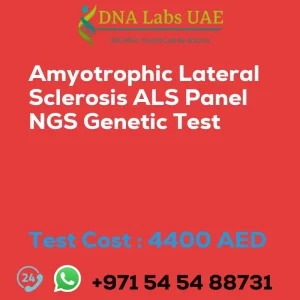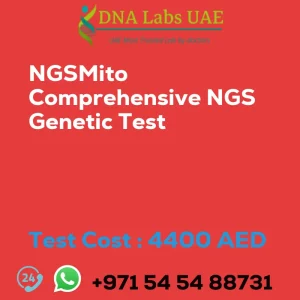IFRD1 Gene Spinocerebellar Ataxia Type 18 Autosomal Dominant Genetic Test
Components
- Price: 4400.0 AED
- Sample Condition: Blood or Extracted DNA or One drop Blood on FTA Card
- Report Delivery: 3 to 4 Weeks
- Method: NGS Technology
- Test Type: Neurological Disorders
- Doctor: Neurologist
- Test Department: Genetics
Pre Test Information
Clinical History of Patient who is going for IFRD1 Gene Spinocerebellar Ataxia Type 18, autosomal dominant NGS Genetic DNA Test. A Genetic Counselling session to draw a pedigree chart of family members affected with IFRD1 Gene Spinocerebellar Ataxia Type 18, autosomal dominant.
Test Details
Spinocerebellar Ataxia Type 18 (SCA18) is a rare genetic disorder characterized by progressive ataxia, which is the loss of coordination and balance. It is an autosomal dominant disorder, meaning that individuals with a single copy of the mutated gene will develop the condition.
The IFRD1 gene, also known as PC4 and SFRS1IP1, is the gene associated with SCA18. Mutations in this gene have been found to cause the disorder. The IFRD1 gene provides instructions for making a protein that is involved in the regulation of gene expression and the processing of RNA molecules.
To diagnose SCA18, a genetic test called Next-Generation Sequencing (NGS) can be performed. NGS is a high-throughput DNA sequencing technology that can analyze multiple genes simultaneously. In the case of SCA18, the NGS test would specifically target the IFRD1 gene to identify any mutations or variations that may be present.
The NGS test for SCA18 can be done using a blood or saliva sample. The sample is sent to a specialized laboratory where the DNA is extracted and sequenced. The sequencing data is then analyzed to identify any mutations or variations in the IFRD1 gene that may be associated with SCA18.
It is important to note that genetic testing for SCA18 is typically performed in individuals who have symptoms of ataxia or a family history of the condition. Genetic counseling is recommended before and after the test to discuss the implications of the results and provide support and guidance.
| Test Name | IFRD1 Gene Spinocerebellar ataxia type 18 autosomal dominant Genetic Test |
|---|---|
| Components | |
| Price | 4400.0 AED |
| Sample Condition | Blood or Extracted DNA or One drop Blood on FTA Card o |
| Report Delivery | 3 to 4 Weeks |
| Method | NGS Technology |
| Test type | Neurological Disorders |
| Doctor | Neurologist |
| Test Department: | Genetics |
| Pre Test Information | Clinical History of Patient who is going for IFRD1 Gene Spinocerebellar ataxia type 18, autosomal dominant NGS Genetic DNA Test A Genetic Counselling session to draw a pedigree chart of family members affected with IFRD1 Gene Spinocerebellar ataxia type 18, autosomal dominant |
| Test Details |
Spinocerebellar ataxia type 18 (SCA18) is a rare genetic disorder characterized by progressive ataxia, which is the loss of coordination and balance. It is an autosomal dominant disorder, meaning that individuals with a single copy of the mutated gene will develop the condition. The IFRD1 gene, also known as PC4 and SFRS1IP1, is the gene associated with SCA18. Mutations in this gene have been found to cause the disorder. The IFRD1 gene provides instructions for making a protein that is involved in the regulation of gene expression and the processing of RNA molecules. To diagnose SCA18, a genetic test called Next-Generation Sequencing (NGS) can be performed. NGS is a high-throughput DNA sequencing technology that can analyze multiple genes simultaneously. In the case of SCA18, the NGS test would specifically target the IFRD1 gene to identify any mutations or variations that may be present. The NGS test for SCA18 can be done using a blood or saliva sample. The sample is sent to a specialized laboratory where the DNA is extracted and sequenced. The sequencing data is then analyzed to identify any mutations or variations in the IFRD1 gene that may be associated with SCA18. It is important to note that genetic testing for SCA18 is typically performed in individuals who have symptoms of ataxia or a family history of the condition. Genetic counseling is recommended before and after the test to discuss the implications of the results and provide support and guidance. |








